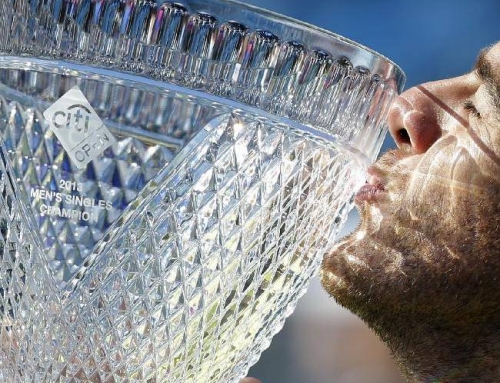 Perhaps one day there will be a player with a huge serve that plays huge off the ground. That’s tough because with a huge serve, there’s not much need to be a great baseliner. Such was the dilemma of Milos Raonic when he faced Rafael Nadal in the second round in Tokyo. Raonic had a great start to the year. He reached the fourth round of the Australian Open. He won San Jose. He reached the finals of Memphis. Just when he was ready to head to the clay, he got injured and took quite a bit of time off. Although he officially came back to play Davis Cup for Canada against Israel, he was not ready to return and had to drop out after the first day.
Perhaps one day there will be a player with a huge serve that plays huge off the ground. That’s tough because with a huge serve, there’s not much need to be a great baseliner. Such was the dilemma of Milos Raonic when he faced Rafael Nadal in the second round in Tokyo. Raonic had a great start to the year. He reached the fourth round of the Australian Open. He won San Jose. He reached the finals of Memphis. Just when he was ready to head to the clay, he got injured and took quite a bit of time off. Although he officially came back to play Davis Cup for Canada against Israel, he was not ready to return and had to drop out after the first day.
Raonic’s big weapon is his serve. When it’s humming, it’s hard to get back. But players like Raonic find it difficult to stay competitive off the ground against Nadal when Nadal is serving. So the match stayed pretty even in the first set with Raonic winning free points off his serve while Nadal won them off the ground and occasionally off the serve. When Nadal got back a few serves, he had chances in the point. Raonic tried hitting big off his forehand but would often miss as much as he made the shot.
Nadal secured a late break in the first set when Raonic was unable to control a volley, and took the first set, 7-5. In the second set, Nadal got a look at more serves, and got a break early on, and eventually rode that break to a relatively routine 6-3 set.
Prior to this match, David Ferrer, number 5 in the world, took on Australian upstart, Matthew Ebden. Ebden had been mostly playing Challengers, but recent results have meant he’s been able to play more events in the main tour. Ferrer started off a bit patchy, missing shots. There was an early exchange of breaks, but then Ebden managed to get a late break and take the first set, 6-4.
Ebden plays relatively big shots, but found himself missing shots up the line, typically a bit wide. Edben tried to outhit Ferrer, but like trying to outhit Nadal, the result ends up in errors. Ferrer started to manage the points better and dictate with his forehand, moving the less than mobile Ebden around. He took the second and third sets, 2 and 2.
Last week, Murray had his third encounter with Donald Young and won easily in the finals at Bangkok. Young had upset him earlier in the year at Indian Wells. The following week, Alex Bogomolov, beat him in Miami where Murray simply played awful, and Bogomolov just played less awful. Even so, Bogomolov’s confidence skyrocketed and he had his best summer ever. However, Murray was hoping for a similarly dominating performance over Bogomolov.
Bogomolov’s strengths are a big forehand that he can move around inside in or inside out pretty well. I was surprised at the pace he was getting off his forehand. Murray did well to match him for pace, but you could see that Murray had to work hard to keep up. I think Murray felt pretty good that he was able to hang in the rallies and wait for the error. At times, Murray also upped his level of aggression especially on return. Bogomolov’s weakness is, alas, his serve. This meant that Murray was in almost every service point forcing Bogomolov into rallies. Meanwhile, Murray was serving well enough to win a few free points each game.
The lopsided final score, 6-1, 6-2, doesn’t quite indicate how well Bogomolov was striking the ball, but it does show that Murray was able to keep up with the pace and win a lot of return points.
Finally, Ivan Dodig took on David Nalbandian. Nalbandian is a little like his contemporary, Juan Carlos Ferrero or even Lleyton Hewitt. They may have played their professional lives in the shadow of Federer, and their rankings may have dropped often due to injury, but they can still hit a ball if things are going well. Nalbandian won the first set over Dodig in a tiebreak then had an easy second set, 6-2.
The quarterfinals in Tokyo are now set. In the top half of the draw, Nadal takes on Giraldo, while Fish takes on Tomic. In the bottom half, Stepanek plays Ferrer, while Murray plays Nalbandian.
Over in Beijing, Tsonga beat Zhang of China who took 7 games off the Frenchman in a straight set loss. Juan Carlos Ferrero beat fellow Spaniard, Marcel Granollers, in straight sets. Kevin Anderson beat Spaniard Albert Montanes in two tiebreaks. Marin Cilic needed 3 sets to beat Italian, Fabio Fognini.
Given the level of players, the quarters in Beijing are pretty tough.
- Tsonga vs. Ferrero
- Berdych vs. Verdasco
- Ljubicic vs. Youzhny
- Anderson vs. Cilic
Some of these players benefited from Monfils and Isner withdrawing.



![[Basel] del Potro wins Basel over Federer for second consecutive year](https://www.essentialtennis.com/wp-content/uploads/2013/10/20131028delpo-500x383.jpg)


